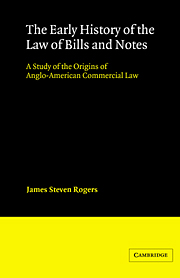 The Early History of the Law of Bills and Notes
The Early History of the Law of Bills and Notes Book contents
- Frontmatter
- Contents
- Preface
- Table of cases and precedents
- Note on citation
- Introduction
- 1 The central courts, commercial law, and the law merchant
- 2 Early exchange transactions: commercial practice
- 3 Early exchange transactions: private law
- 4 Early exchange transactions: public law and policy
- 5 From exchange transactions to bills of exchange: the transformation of commercial practice
- 6 The custom of merchants and the development of the law of bills
- 7 The civilians and the law of bills in the seventeenth century
- 8 Transferability and negotiability
- 9 The law of bills and notes in the eighteenth century
- 10 The problem of accommodation bills
- Conclusion
- Bibliography
- Index
7 - The civilians and the law of bills in the seventeenth century
Published online by Cambridge University Press: 22 September 2009
- Frontmatter
- Contents
- Preface
- Table of cases and precedents
- Note on citation
- Introduction
- 1 The central courts, commercial law, and the law merchant
- 2 Early exchange transactions: commercial practice
- 3 Early exchange transactions: private law
- 4 Early exchange transactions: public law and policy
- 5 From exchange transactions to bills of exchange: the transformation of commercial practice
- 6 The custom of merchants and the development of the law of bills
- 7 The civilians and the law of bills in the seventeenth century
- 8 Transferability and negotiability
- 9 The law of bills and notes in the eighteenth century
- 10 The problem of accommodation bills
- Conclusion
- Bibliography
- Index
Summary
One of the meanings that is sometimes given to the notion that the law of bills developed by incorporation of the law merchant is that the judges of the common law courts looked to the writings of continental jurists and their English followers as the basis of the law of bills. It is certainly true that by the seventeenth century a substantial literature had developed outside the sphere of the common law on the subject of mercantile affairs and mercantile law. This chapter considers whether it is really the case that this body of literature had any significant influence on the development of the English law of bills of exchange in the seventeenth century.
CIVILIAN LITERATURE ON THE LAW MERCHANT AND EXCHANGE
In the sixteenth and seventeenth centuries, continental jurists began to regard the affairs of merchants as matters of sufficient interest to warrant special attention and separate treatment in legal writing. Beginning with Benvenuto Straccha's De Mercatura, seu Mercatore Tractatus published in Venice in 1553, a substantial literature on commercial law developed. From the time of Sigismundo Scaccia's Tractatus Commerciis et Cambio (1619), exchange transactions were an important topic in this literature. As Sutherland has pointed out, one consequence of the continental jurists' interest in merchants' affairs was that the phrase ‘law merchant’ took on a new meaning. In medieval times the term had little more content than the notion that cases involving travelling merchants should be resolved expeditiously.
- Type
- Chapter
- Information
- The Early History of the Law of Bills and NotesA Study of the Origins of Anglo-American Commercial Law, pp. 151 - 169Publisher: Cambridge University PressPrint publication year: 1995
